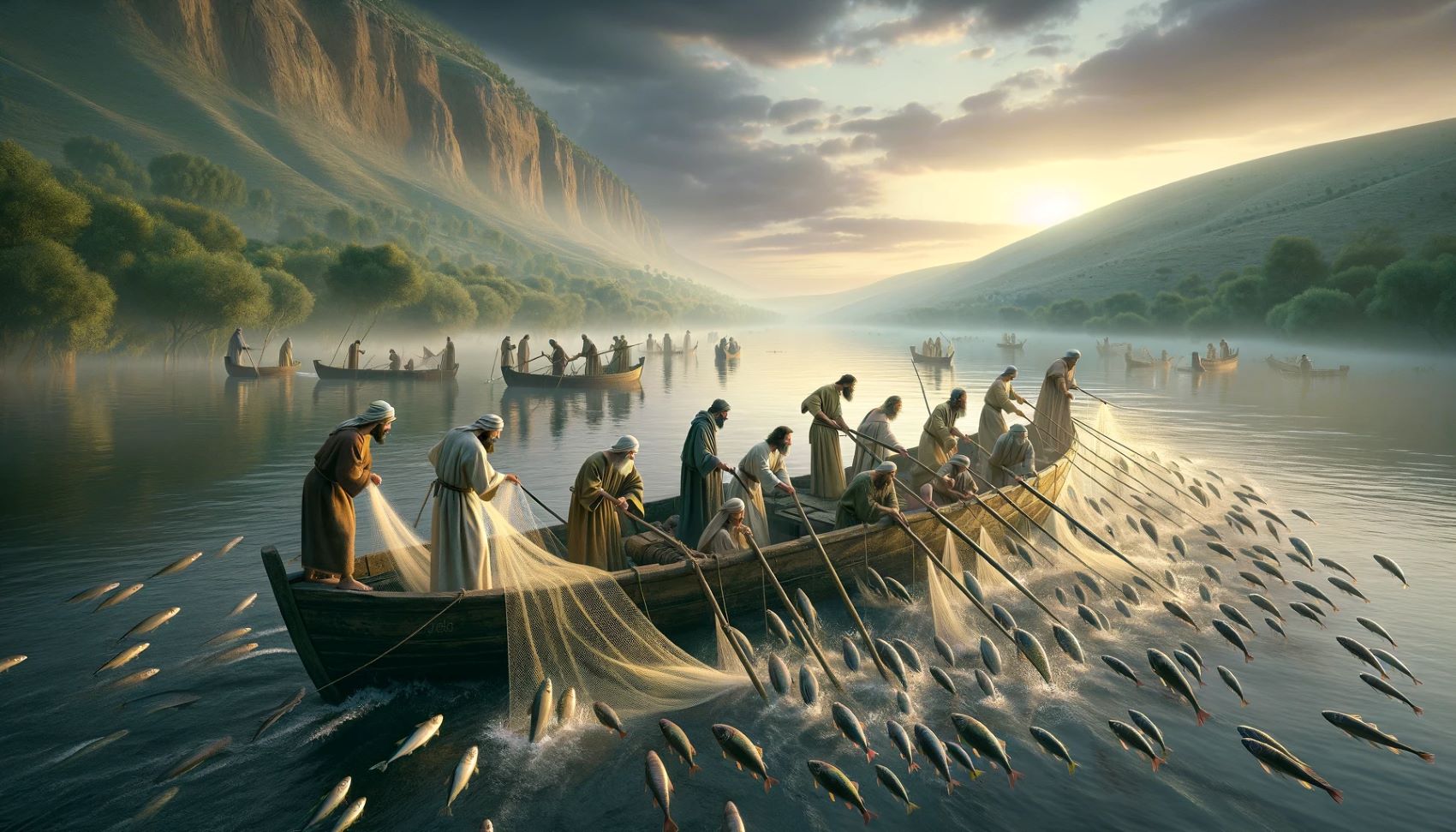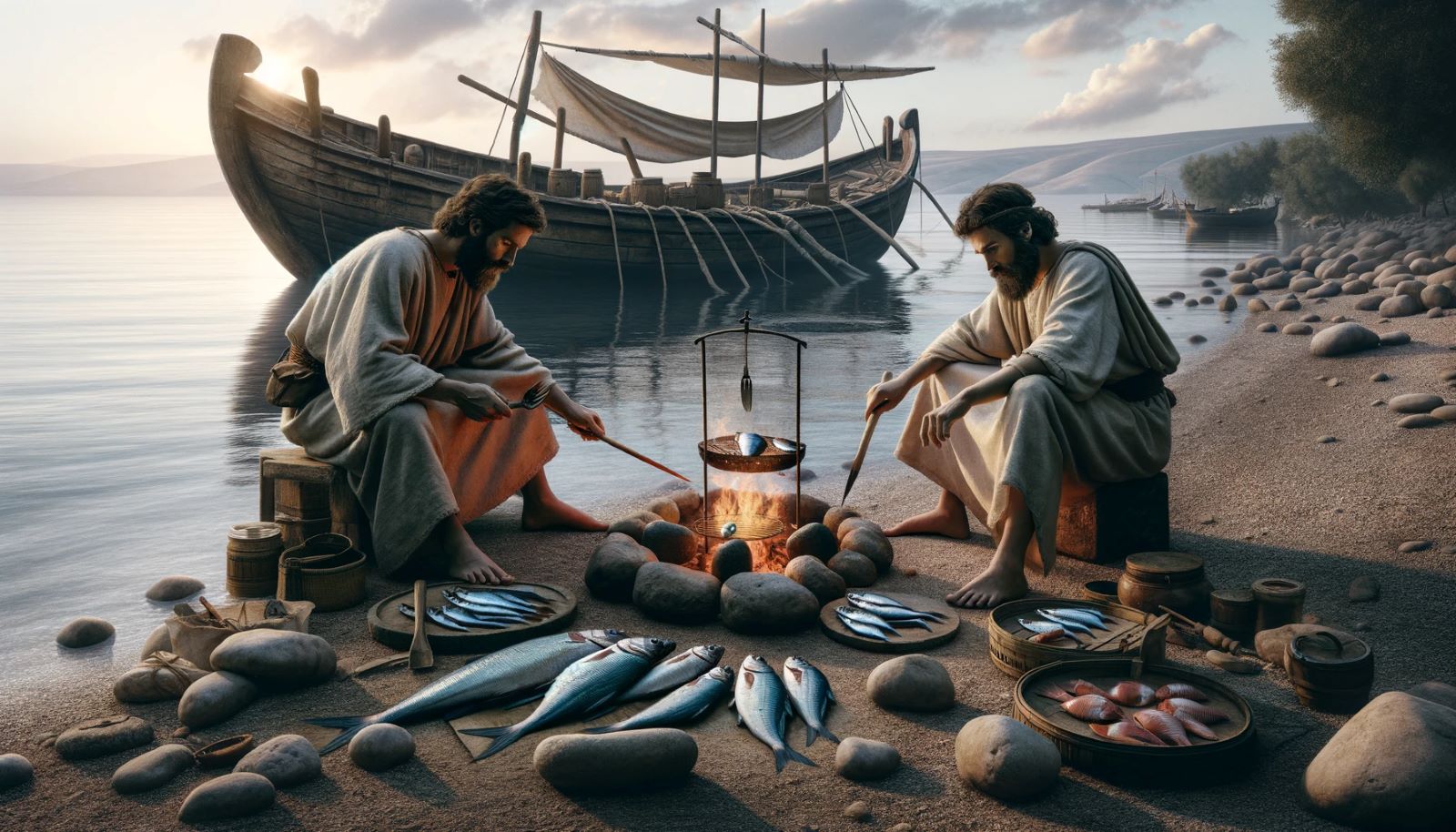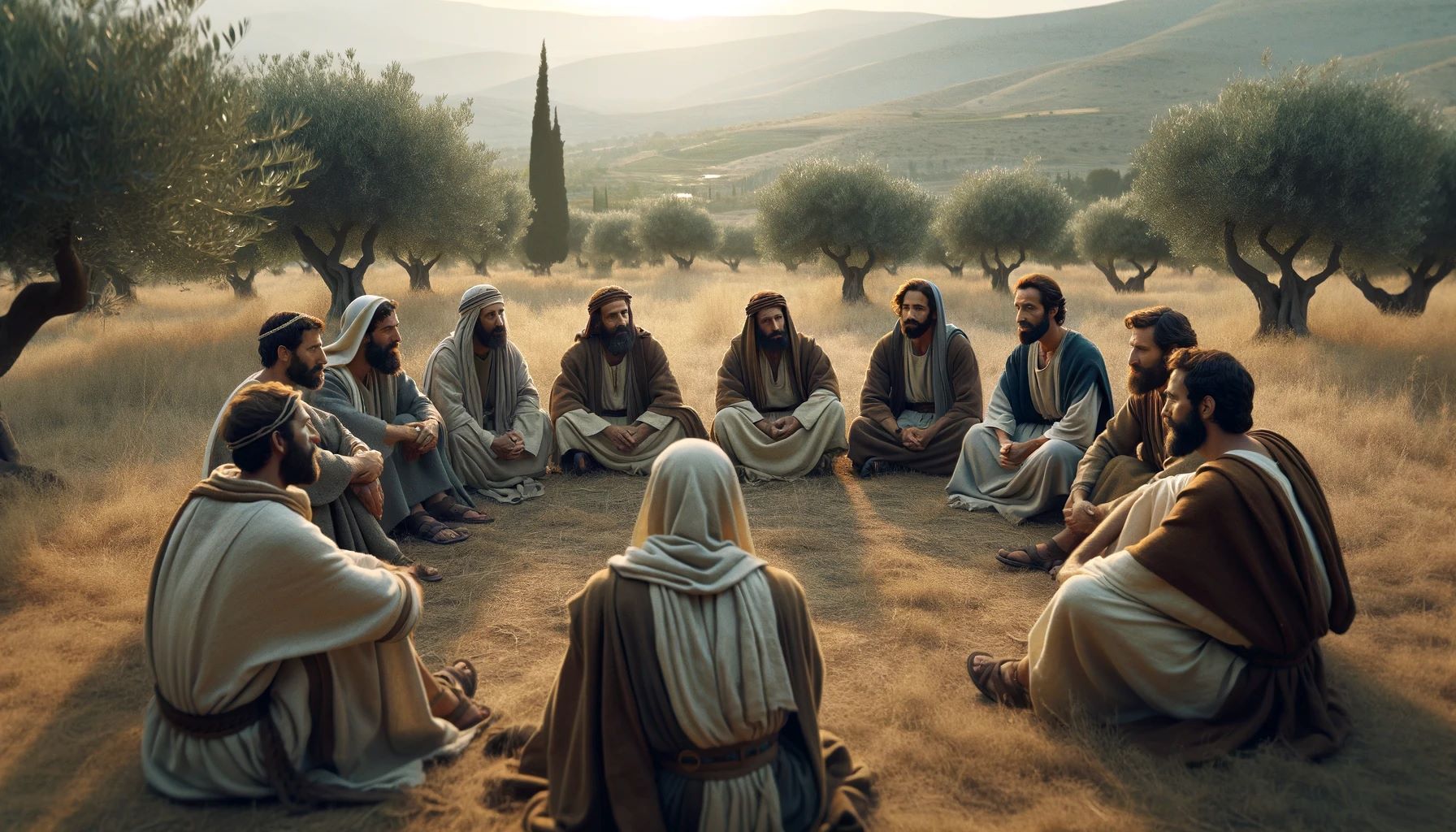Home>Bible Facts>What Kind Of Fish Did The Apostles Catch


Bible Facts
What Kind Of Fish Did The Apostles Catch
Published: February 22, 2024
Ericka Andersen, an editor at Christian.net, expertly merges digital strategy with content creation, focusing on faith and societal issues. Her communication skills enhance the platform's engaging narratives, fostering meaningful dialogue on belief's impact on society.
Discover fascinating Bible facts about the types of fish the Apostles caught. Explore the significance of this event in biblical history and its relevance today. Uncover the spiritual lessons behind their miraculous catch.
(Many of the links in this article redirect to a specific reviewed product. Your purchase of these products through affiliate links helps to generate commission for Christian.net, at no extra cost. Learn more)
Table of Contents
Introduction
The activities and experiences of the apostles are deeply ingrained in the historical and cultural tapestry of Christianity. Their lives, teachings, and even their occupations provide valuable insights into the world during the time of Jesus Christ. One of the most intriguing aspects of the apostles' lives is their profession as fishermen. The biblical narrative often depicts them engaged in the art of fishing, casting their nets into the Sea of Galilee. This occupation not only served as their livelihood but also held profound symbolism within the context of their spiritual journey.
The apostles' occupation as fishermen was not merely a means of sustenance; it was a reflection of their earthly existence and the metaphorical significance of their calling. Understanding the nature of their work, the environment in which they operated, and the types of fish they caught provides a deeper understanding of the apostolic era and the cultural backdrop against which their ministry unfolded.
Delving into the intricacies of the apostles' fishing endeavors unveils a world teeming with symbolism, practicality, and spiritual significance. It offers a glimpse into the daily lives of these revered figures, shedding light on the challenges they faced, the skills they honed, and the profound lessons they gleaned from their experiences on the Sea of Galilee. As we explore the types of fish they caught and the methods they employed, we unravel a rich tapestry of historical and spiritual insights that continue to resonate with believers and scholars alike.
The apostles' fishing activities were not confined to the realms of mere occupation; they were intertwined with the very fabric of their spiritual journey and the timeless lessons they imparted to future generations. By delving into the world of the apostles' fishing exploits, we embark on a captivating journey that transcends time and offers a profound understanding of their lives and the enduring legacy they left behind.
Read more: What Did The Apostles Teach
The Sea of Galilee
The Sea of Galilee, also known as Lake Tiberias or Kinneret, holds immense historical, geographical, and spiritual significance. Situated in the northern part of Israel, it is the lowest freshwater lake on Earth and is nestled amidst picturesque landscapes that have captivated travelers and pilgrims for centuries. The sea, measuring approximately 13 miles long and 8 miles wide, serves as a vital water source for the region and has been a focal point of human activity since ancient times.
The Sea of Galilee's prominence in biblical narratives, particularly in the context of the apostles' lives, adds a layer of profound significance to its tranquil waters. It was on the shores of this serene lake that Jesus performed miracles, delivered profound teachings, and called upon fishermen to become his disciples. The apostles, many of whom hailed from the fishing town of Capernaum on the northern shore, navigated these waters as they cast their nets and honed their skills as fishermen.
The geographical and ecological richness of the Sea of Galilee contributed to the abundance of fish that thrived in its depths. Its strategic location along ancient trade routes and its role as a vital water source facilitated a thriving fishing industry, sustaining the livelihoods of communities that depended on its bountiful resources. The apostles' intimate connection with the Sea of Galilee, both as a source of sustenance and a backdrop for their spiritual journey, underscores the profound interplay between their daily lives and their higher calling.
The Sea of Galilee's tranquil beauty, coupled with its historical and spiritual significance, continues to draw visitors from around the world. Its shimmering waters and surrounding landscapes evoke a sense of timelessness, inviting contemplation and reflection. For the apostles, this serene expanse was not merely a body of water; it was a stage upon which their destinies unfolded, their faith was tested, and their profound encounters with Jesus transpired.
As we delve into the apostolic era and the significance of the Sea of Galilee in shaping the lives of the disciples, we embark on a journey that transcends geographical boundaries and temporal constraints. The sea, with its storied past and enduring allure, remains an indelible part of the apostolic narrative, inviting us to explore its depths and glean insights into the lives of those who traversed its shores.
Fishing in the Time of the Apostles
During the time of the apostles, fishing was not only a means of sustenance but also a vital component of the regional economy and way of life. The Sea of Galilee, with its abundant fish population, served as a primary source of livelihood for many communities, including the apostles who were predominantly fishermen before being called by Jesus. The fishing techniques employed during this era were reflective of the prevailing methods in the ancient Near East, characterized by the use of hand-thrown nets, fishing boats, and communal fishing practices.
The apostles, hailing from the fishing town of Capernaum, were intimately familiar with the nuances of fishing in the Sea of Galilee. They navigated its tranquil waters, cast their nets, and engaged in the timeless art of fishing, honing their skills amidst the backdrop of this picturesque setting. The fishing industry, deeply intertwined with the region's cultural and economic fabric, provided the apostles with a tangible connection to the rhythms of daily life and the challenges inherent in their occupation.
Fishing during this era was a labor-intensive endeavor that required patience, skill, and an intimate understanding of the sea's ebbs and flows. The apostles, along with other fishermen of the time, ventured out into the waters in search of a bountiful catch, often working through the night to maximize their efforts. Their experiences on the Sea of Galilee not only shaped their practical abilities as fishermen but also provided a fertile ground for the spiritual lessons that would later define their roles as messengers of the Gospel.
The apostles' familiarity with the intricacies of fishing in the Sea of Galilee underscores the tangible nature of their experiences and the authenticity of their earthly endeavors. Their occupation as fishermen was not incidental; it was a deliberate choice made by Jesus to call individuals who understood the toils and triumphs of a fisherman's life. As we delve into the world of fishing in the time of the apostles, we gain a deeper appreciation for the intersection of their daily labors and the profound spiritual journey that awaited them, transcending the boundaries of occupation and embracing the timeless truths that would shape their destinies.
Types of Fish Caught by the Apostles
The apostles, being seasoned fishermen on the Sea of Galilee, were adept at catching a variety of fish that thrived in the lake's fertile waters. The diverse ecosystem of the Sea of Galilee supported an array of fish species, each with its unique characteristics and culinary significance. Among the notable types of fish caught by the apostles were:
-
St. Peter's Fish (Tilapia): Also known as "St. Peter's Fish" due to its association with the apostle Peter, the Tilapia, particularly the Galilean tilapia, was a prized catch. This fish, often depicted in biblical narratives, was a staple in the diet of the local populace and held cultural significance. Its mild, white flesh made it a favored choice for consumption, and its abundance in the Sea of Galilee ensured that it featured prominently in the apostles' catches.
-
Barbels and Catfish: These bottom-dwelling species were commonly caught by the apostles using nets and fishing lines. Barbels, known for their distinctive barbels or whisker-like organs around their mouths, and catfish, with their whisker-like sensory organs, were prevalent in the Sea of Galilee's depths. Their presence added diversity to the apostles' catches and provided sustenance to the communities along the lake's shores.
-
Musht: The musht, a type of mullet, was another fish species that found its way into the apostles' nets. This resilient fish, known for its adaptability to varying salinity levels, was a valuable source of protein and sustenance for the local inhabitants. Its inclusion in the apostles' catches underscored the ecological richness of the Sea of Galilee and the diversity of marine life that sustained the fishing communities.
-
Sardines and Herring: These small, silvery fish were abundant in the Sea of Galilee and formed a significant part of the apostles' catches. Sardines and herring, known for their shoaling behavior, were captured using nets and were a vital source of nutrition for the populace. Their presence in the apostles' daily hauls exemplified the interconnectedness between the fishing industry and the dietary habits of the region.
The apostles' proficiency in catching these diverse fish species reflected their intimate knowledge of the Sea of Galilee's aquatic resources. Their ability to navigate the waters and secure plentiful catches of varied fish underscored the practical skills they possessed as fishermen. Moreover, the types of fish they caught not only sustained their physical needs but also served as poignant symbols in the narratives of Jesus' ministry, adding layers of significance to their fishing endeavors.
Significance of the Apostles' Fishing Activities
The apostles' fishing activities held profound significance, transcending the realms of mere occupation and delving into the core of their spiritual journey. Their experiences as fishermen on the Sea of Galilee were intricately woven into the tapestry of their calling as disciples of Jesus Christ, imbuing their daily labors with layers of symbolism and spiritual resonance.
The act of fishing, with its inherent challenges, uncertainties, and reliance on the elements, mirrored the essence of the apostolic journey. It served as a tangible representation of the apostles' earthly existence, characterized by toil, perseverance, and the navigation of life's unpredictable currents. Their encounters with turbulent waters, the arduous task of casting and hauling nets, and the patient anticipation of a fruitful catch mirrored the trials and triumphs that awaited them in their roles as messengers of the Gospel.
Furthermore, the act of fishing was intricately linked to the teachings and parables of Jesus Christ. The metaphor of "fishers of men," as articulated by Jesus when he called upon the apostles, underscored the profound parallels between their fishing endeavors and their higher calling to spread the message of salvation. The apostles, through their experiences as fishermen, gleaned invaluable lessons in patience, perseverance, and the transformative power of faith—lessons that would later resonate in their ministry and the propagation of the Christian faith.
The types of fish they caught also held symbolic significance within the context of their spiritual journey. The imagery of casting nets and hauling in a diverse array of fish mirrored the inclusivity of their mission—to reach people from all walks of life, embracing diversity and nurturing a community of believers. Each fish caught by the apostles represented a soul to be touched, a life to be transformed, and a testament to the boundless grace and providence of God.
Moreover, the apostles' fishing activities served as a bridge between their earthly experiences and the profound encounters they had with Jesus. The shores of the Sea of Galilee, where they toiled as fishermen, became hallowed ground where they witnessed miracles, received teachings, and forged an unbreakable bond with their master. The tranquil waters that bore witness to their daily toils also became the stage for transformative moments that shaped their faith and solidified their commitment to the divine calling.
In essence, the apostles' fishing activities were not merely a means of livelihood; they were a microcosm of their spiritual odyssey. Their experiences as fishermen, intertwined with the teachings of Jesus and the symbolism of their catches, encapsulated the essence of their earthly pilgrimage and the timeless truths they would impart to future generations. The apostles' fishing endeavors, steeped in practicality and imbued with spiritual significance, stand as a testament to the seamless integration of the mundane and the divine, offering profound insights into the lives of those who cast their nets into the Sea of Galilee.
Read more: What Did The Apostles Do?
Conclusion
The apostles' occupation as fishermen on the Sea of Galilee was not merely a historical footnote; it was a profound embodiment of their earthly journey and spiritual calling. Their experiences navigating the tranquil waters, casting their nets, and hauling in diverse catches of fish encapsulated the essence of their lives as disciples of Jesus Christ. The significance of their fishing activities reverberates through the annals of Christian history, offering timeless lessons and insights that continue to resonate with believers and scholars alike.
The Sea of Galilee, with its serene beauty and ecological richness, served as a backdrop for the apostles' daily endeavors. Its shimmering waters bore witness to their toils, their encounters with Jesus, and the transformative moments that shaped their faith. The types of fish they caught, from the prized Tilapia to the humble sardines, held symbolic significance, mirroring the inclusivity of their mission and the diverse souls they were called to reach.
Furthermore, the act of fishing itself became a metaphor for their spiritual odyssey. The apostles, through their experiences as fishermen, gleaned profound lessons in patience, perseverance, and the transformative power of faith—lessons that would later resonate in their ministry and the propagation of the Christian faith. Their earthly labors seamlessly intertwined with their higher calling, bridging the mundane and the divine in a seamless tapestry of purpose and meaning.
As we reflect on the apostles' fishing activities, we are invited to delve into a world teeming with symbolism, practicality, and spiritual significance. Their occupation as fishermen was not incidental; it was a deliberate choice made by Jesus to call individuals who understood the toils and triumphs of a fisherman's life. The apostles' experiences on the Sea of Galilee offer a profound understanding of their lives and the enduring legacy they left behind, transcending geographical boundaries and temporal constraints.
In essence, the apostles' fishing endeavors, steeped in practicality and imbued with spiritual significance, stand as a testament to the seamless integration of the mundane and the divine. Their lives as fishermen on the Sea of Galilee serve as a poignant reminder that within the ordinary rhythms of daily existence lie extraordinary opportunities for faith, transformation, and the enduring legacy of a timeless message.














